How 5e Con Sorcerers Not Only Work, But Thrive
By Riley Rath
"CON Sorcerers" Are Unique, Fun, and Don't Break D&D's Balance (see Objections)
It's a shame that something so cool could be so sucky...
The general consensus among DND players is that the Sorcerer class kinda sucks. It is usually mentioned along with Rangers and Monks in the "worst player character class" conversation.
5e Sorcerers are boring... and fragile... and underpowered.
But what's always been confusing is that there is a really simple way to improve everything about the DND 5e Sorcerer and help it stand out among the other classes:
Make them a dnd constitution spellcaster... Make a "CON Sorcerer."
I know it's a bit controversial, and surely the game designers did not do this for a good reason. But I think that with a few changes, and a little homebrewing here and there, the CON Sorcerer becomes a unique and fun spellcaster that is actually more balanced than before!
Table of Contents
- Summary of the 5e Sorcerer Problem
- The Benefits of the Sorcerer as a 5e CON Spellcaster
- DnD 5e CON Casting
- Sorcerers and "Willpower"
- The Objections (And Rebuttals) to a 5e Constitution Sorcerer
- Conclusion
Summary of the 5e Sorcerer Problem
First of all, before we talk about a con sorcerer... what makes a D&D sorcerer? The sorcerer is a magic-filled spellcasting class, one of many D&D classes players can choose from when making their characters. They have low hit-dice (health) and can use "Meta-Magic" to augment their small list of known spells.
And while all of that is definitely cool... the other spellcasting classes are a lot cooler.
- Wizards have more versatility and tools
- Clerics are more helpful
- Druids can survive a lot longer
- Bards and warlocks are more interesting/effective "faces" (social experts) for the party
- And ALL of them can blast bad guys with big spells
Everything sorcerers do, the other classes do better, and meta-magic isn't good enough to compensate for these shortcomings.
Players agree that the 5e sorcerer sucks because it is boring and weak compared to the other spellcasting classes.
It's as though the conversation for building the sorcerer went something like this:
Person 1: "What if a wizard was ALSO really cool, charming, and not a bookworm?"
Person 2: "Yeah! And what if that wizard had, like, 1/8th the spells they normally know?"
Person 1: "Wait... why would we do that?"
Person 3: "Oh! And, and, and... and what if they could bend those spells a little bit, but only a few times, and only in very few ways?"
Person 1: ...
Person 2 and 3: (Enthusiastic high five)
Person 1: "I don't think that would be a very good idea..."
Person 2: "Just sent in the final draft."
There are all sorts of adjustments to the sorcerer class, giving them more spells, more sorcery points, more meta-magic options...
But I think switching the spellcasting ability from charisma to constitution is the simplest and easiest way. No complex rules... no new math... no relying on overpowered subclasses.
In 5e, the sorcerer needs to improve and stand apart from the crowd, and giving them a constitution spellcasting ability... allowing for a con sorcerer... would solve both those problems.
The Benefits of a CON Sorcerer
In general, I can think of four ways sorcerers would improve just by making constitution their spellcasting ability:
1. Sorcerers Would Become Unique
As the only constitution caster, a CON Sorcerer would stand out. No more stepping on the toes of other classes or failing to measure up: the sorcerer would be in a league of its own.
Currently, the sorcerer's spellcasting ability is charisma (CHA... more on that later...) but there are already a toooooon of charisma-based casters; nearly a third of the classes in the game!
And it not only makes way more sense that a bard or a warlock would use charisma, but charisma is more fun and intuitive with those classes... emphasizing the social skills makes sense when you are constantly entertaining masses or depending on a good relationship with a "higher power" for your spellcasting.
The charisma table is overcrowded... and the sorcerer subclasses do not add enough variety... the sorcerer needs to get up and eat its lunch somewhere else.

2. Players Could Use Fun Mechanics
With CON as a spellcasting modifier, the sorcerer takes on a totally new flavor and opens the door to homebrew rules that can make it more fun to play.
Since their spellcasting is tied to their health, maybe a nat 1 spell attack takes a toll on their body or they take damage? Maybe they absorb certain damage types, like the Absorb Elements spell? Or maybe they can expend health rather than sorcerery points to gain more spell spots, losing more and more HP each time they do it?
The CON sorcerer is a little more unique, a little more fun, and a little more powerful.
When the spellcaster is fighting to control the magic raging within them and relying on their constitution to do so, any and all of these are exciting possibilities!
3. Role-Playing Would Be More Creative
Take away charisma as the default high stat and make the sorcerer a 5e CON spellcaster, and this makes the class much more interesting to role-play, with a lot more options than just "magic-prodigy cool person."

Rather than being forced to be the social butterfly, players can choose how their sorcerer came to grips with their magical powers. Did they isolate themselves as a kid to prevent hurting people? Have they grown tired of trying to control it and now live with reckless abandon? Did they dive deep into discipline or meditation to try to always be sensitive to the magic within them?
By not demanding a high charisma, there is more freedom for players to creatively role-play.
4. Sorcerers Would Become More Powerful
Usually, a caster's biggest problem is just staying alive. For the CON sorcerer, this suddenly becomes a much smaller problem.
Now, don't worry, their hit die is still a d6—the lowest in the game—meaning they will remain a glass cannon. But now, with a +4 or a +5 to their health every time they level up, they can take a hit or two before needing a medic.
Also... constitution helps them concentrate when they take damage! This presents a more alluring trade off for players when considering playing a sorcerer or a wizard: the wizard has more spell options, but with the CON sorcerer there is a lower chance you drop concentration, meaning you'll get even more out of the spells you cast.
It's just better!
In short, making sorcerers constitution casters in 5e, or at least offering that option to your players, is a simple adjustment that makes the sorcerer class a little more unique, a little more fun, and a little more powerful than before.
But apart from gameplay, there is another good reason to allow a CON Sorcerer: it makes a lot more sense!
Dnd 5e CON Casting

If you are here cuz of Brennan Lee Mulligan's video... I am 90% sure this is the section he is referring to...
Before anyone starts freaking out about how CRaaaaAAAAaaaZY a constitution caster would be... know that there is already a precedent for constitution casters in DND!
In 3.5, there was the popular homebrew "Blood Mage" prestige class that used their own health to cast spells.
But 5e has OFFICIAL examples of constitution casting: the genasi and the Aberrant Dragonmark feat. The reason given for using CON rather than some other ability is due to the racial origin of magic; the magic is bound to their being, sort of a part of their fantasy DNA.
Many sorcerers also inherit their magic through their ancestors. The draconic sorcerer subclass states how the draconic magic is "mingled into the bloodline" and "flows throughout your body" (PHB, 102).

But not all sorcerers get magic through their genes. Some are bound to magic via a celestial/fey blessing, demonic curse, monster/magical blood infusion, wizard experiment, exposure to raw magic or planar forces, etc. (PHB, 99-102).
Even if the magic touched a sorcerer's soul rather than the bloodstream, it is still woven into who they are.
But focusing on their specific source of origin misses the point.
Regardless of the origin, a sorcerer's magic is bound to their very existence. Just like genasi and dragonborn, the sorcerer's magic is with them for life... it was there at birth and it will be there at death.
Still don't believe me? Take a second look at the Aberrant Dragonmark... guess which spell list the players can pick from? That's right... THE SORCERER!
Why? Because just like the sorcerer, the magic of the Aberrant Dragonmark comes from the very being.
Whether by blood, curse, blessing, or cataclysm... sorcerers are infused with magic. It is blended with their whole being and requires their whole being to control and wield.
And that is exactly why it makes no sense for sorcerers to be charisma casters...
Sorcerers and "Willpower"
In the Player's Handbook, the decision to make a sorcerer a charisma-based caster is because "the power of your magic is based on your ability to exert your will on the world" (PHB, 101).
This definition could roughly apply to the other charisma-based spellcasting classes. A bard's magic comes from the "heart and soul" of their music, a paladin's from "the strength of their convictions," and a warlock's through a deal with a higher power.
Rather than religious practice (Cleric), understanding (Druid), or learning (Wizard)... Bards, Warlocks, and Paladins exert their "will": their conviction/belief/passion... to harness and cast magic.
It is kind of like the superhero Green Lantern: Sorcerers have access to a power that is distinct from them, and through their will they are able to wield that power.
One tiny problem...
Dnd 5e sorcerers do not fit the standard "willpower" definition for other CHA casters!

Look at the descriptions of the sorcerer's source of magic, all found in the Player's Handbook:
- "A spellcaster who draws in inherent magic from a gift or a bloodline" (45).
- "Magic is a part of every sorcerer, suffusing body, mind, and spirit with a latent power that waits to be tapped" (99).
- "...an ancient bloodline infused with magic..." (99).
- "Others carry a raw, uncontrolled magic within them..." (99)
- "By learning to hardness and channel their own inborn magic..." (99)
- "People with magical power seething in their veins..." (99)
- "... a wave of magic surges up in him, through him, and out of him..." (99)
For a D&D sorcerer, magic is inborn... infused... inherent... latent... innate... within... suffused...
- "... he magic force that infuses them..." (100)
- "...the magic power coursing through you..." (100)
- "An event in your past, or in he life of a parent or ancestor, left an indelible mark on you, infusing you with arcane magic" (101).
- "... which describes the source of your innate magical power..." (101)
- "... deep wellspring of magic within yourself" (101).
- "... claim different sources for their innate magic" (102).
- "Your innate magic comes from the forces of chaos that underlie the order of creation" (103).
No spellbooks, prayers, or instruments needed. No patrons to bargain with or deities to worship. No music to play or passion to muster.
Just... existing.
But sorcerers are united with their magic... it is an indivisible part of who they are. If it was only infused in the body, then strength might be a good stat... If it was in just their mind, then intelligence...
But magic is a part of their whole being... WHICH IS REPRESENTED BY CONSTITUTION!!!

© Applibot, Inc. / Legend of the Cryptids
"A sorcerer's magical power is embedded with their very being... requiring the entirety of their being to wield."
CON is the "whole being" stat... it's how you withstand great difficulty being exerted upon you. It doesn't matter what attacked you or what type of damage you took... when you are fighting to keep yourself alive... you make a CON save.
And when you are fighting to control the powerful magic that has been infused into your very being, magic that wants to be used, you have to be a hearty, resilient, durable person... not a charismatic personality. Which means constitution should be the casting stat.
To summarize, here is the argument for CON over CHA:
- For sorcerers, the magic is immersed in their whole being.
- The stat for living and dying is constitution.
- Therefore, constitution should be the "whole being" stat.
- Ergo, sorcerers should be constitution casters.
The Objections (and Rebuttals) to a 5e Constitution Sorcerer
Like I said, the "CON Sorcerer" is a controversial idea, and it is not without its problems. Here are some of the most common objections to a constitution caster and some responses.
Objection: "This presents virtually no downside for a melee Fighter to multiclass into CON Sorcerer."
Response: That's game breaking... so don't allow it.
Martial classes have opposite needs from spellcasting classes. Trying to have the best of both worlds forces you to divide your ability score improvements, likely resulting in a bad character or one that is unoptimized.
But with a 5e CON sorcerer, you could multiclass into a melee fighter without having to invest in an additional stat ability. This is the same reason Paladins are CHA rather than Clerics even though they (mostly) draw their power from the same source: it would be an overpowered multiclassing option.
The solution? NO MULTICLASSING WITH A CON SORCERER.
Just make the CON Sorcerer an option players can take, but one that cannot multi-class.
Boom. Problem Solved.
Objection: "Meta-magic is enough of a boost to balance them with other spellcasters."
Response: Meta-magic is not enough to make a 5e CON sorcerer unique and fun.
A 20th level sorcerer only has a measly 4 meta-magic options, and at low levels, CON sorcerers have so few sorcerery points that they can only use them sparingly, for emergencies, rather than as a core mechanic to the class that players can enjoy.
Objection: "Constitution spellcasting is unfair because every class benefits from CON... that's too much power in a single attribute."
Response: Every class also benefits from dexterity.
Because DEX is tied to initiative and a common spell save, every single class benefits from a high DEX ability score. Wisdom is also very helpful, as the perception skill is used to notice nearly everything in an imaginative game. Despite this, no one complains about rogues, druids, or monks being OP.
Objection: "Other than bard, you can make a case that every CHA caster should be something other than CHA... you would be making CHA a silly joke-stat all over again."
Response: Role-playing is too important in D&D for CHA to be neglected.
True, the past charisma was treated as a joke. But that was back when Dungeons and Dragons was more akin to wargaming and had less emphasis on role-playing. In 5th edition, not having a high CHA character is WORSE than not having a healer!

Objection: "Powerful spellcasters are supposed to be balanced by their fragility. Having sorcerers max out CON will make them too hard to kill."
Response: (Silently points to the text that says "hit dice: 1d6").
Yes, having a +5 to CON will help them fight... but it's not like they'll suddenly turn into a Spirit Totem Barbarian! When rolling for their hit points, they still use a d6, which will still result in a very fragile, very vulnerable, very "oh geez, I hope they don't have Power Word Kill..." character. Any cleric character is still way harder to kill.
Objection: "The rules-as-written sorcerer assigns points on 1) CHA, then 2) CON or DEX. There are usually not enough stat points to max out all three, so like all classes, they have to prioritize some over others. This choice between three abilities is essential to keeping classes balanced in DnD 5e. If you only need 2 stats (in the "CON Sorcerer's" case, CON and DEX for AC) it would be way overpowered!"
Response: Require another ability for sorcerery.
Fair point! Imagine if the barbarian's abilities only required STR and CON! They would be unstoppable! Though the Circle of the Moon Druid really only needs WIS, and I don't hear anyone complaining...
But, admittedly, certain players require restrictions, so responding to this objection means tinkering with ability scores/the rules. We want the CON Sorcerer to be stronger, but not too much stronger. One solution is to use a different ability for some of the minor mechanics. Here are some ideas:
- Add the Draconic Sorcerer's "elemental affinity" 6th level ability to all sorcerers, but use a different ability modifier instead of CON.
- Use one ability to hit/DC and another ability for damage.
- Have their sorcerery points be based on a different stat... maybe a base amount plus the modifier... or 2x the ability modifier + their sorcerer level.
- Have their spellcasting modifier be the average of their CON and an additional ability.
Thematically, you could reason that CON Sorcerers use constitution to "keep a lid" on the magic, but another ability to wield it effectively. Also, as long as the player could justify it, basically ANY ability could be used, resulting in unique and interesting characters!
Objection: "A CON Sorcerer promotes the wrong races as good spellcasters."
Response: Really... THAT is your objection???
Mechanically, dwarves are the best suited constitution casters in the game. But this conflicts with the original lore that describes dwarves as religious stoics who are wary of magic. And for fans of classic fantasy, something feels right about having half-orc barbarians, firbolg druids, tiefling warlocks, and dragonborn sorcerers...
BUT... I think this objection hints at problems with how DND 5e does races rather than this CON Sorcerer idea. And with Tasha's "customized lineage," where you can assign +2/+1 to any stats regardless of race, this whole objection becomes irrelevant.
Objection: "CHA is the willpower stat, not CON."
Response: Yes... but the text on charisma spellcasting is dumb and unclear.
Mature of me, I know, but this is a subject for an entire other blog post. So, briefly, here is my response:
- The definition and use for charisma in 5e is both too broad and unclear.
- Charisma is about personality and character, not energy or determination.
- Charisma is inherently relational, requiring an object to be socially influenced or acted upon.
In short, every class and player character has a will that they use to act on the world, so relegating will to the CON Sorcerer is inappropriate.
Conclusion to Constitution Caster 5e in Dungeons and Dragons
Fireflaught 7-Dice Set
There is no dnd constitution spellcaster. Providing the option for 5e CON Sorcerers is a no-brainer. It makes thematic sense, balances out the underpowered class, and is more fun to play.
Disagree? Prefer these adjustments on DMS Guild? Comment and let us know.
But if you love this idea... we encourage you to play it! And if you need any sorcerer dice, we would be happy to help you out.
I currently use the CON sorcerer rules for a PC in my campaign: a half-orc storm sorcerer named "Sinead." And not only is she more powerful and extremely fun to play... she still goes down in combat ALL THE TIME!
Overpowered??? Please...
By Riley Rath - Freelance DnD Copywriter

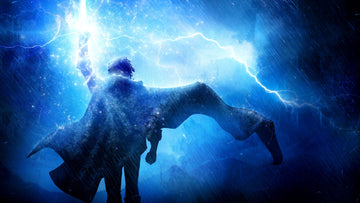

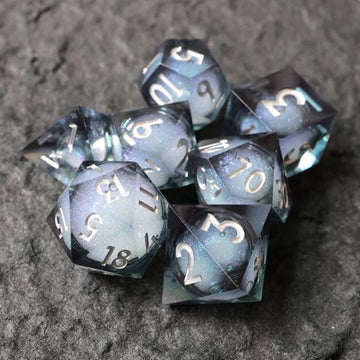
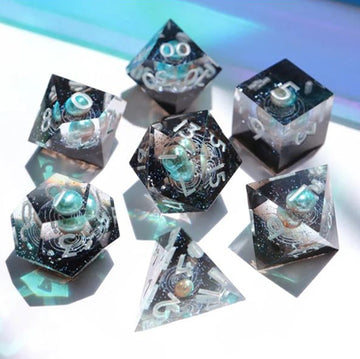
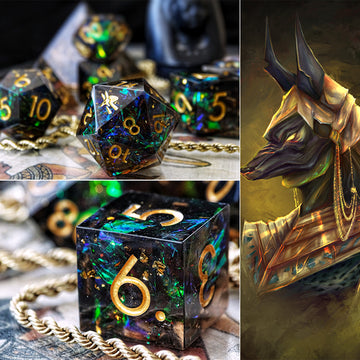
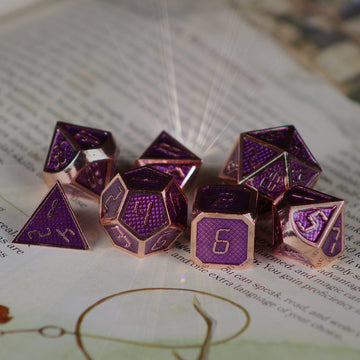
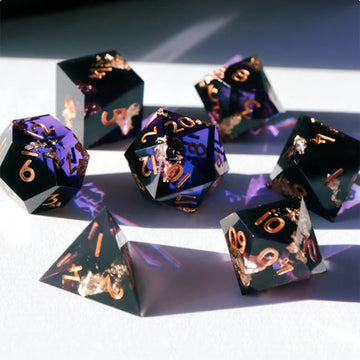
1. They are channeling energy through their bodies which over time would be exhusting. Which in turn allow them to pump up their magic ability but it would be at a cost.
2. It would allow them to to be more effective as a range fighter or able to protect the group better.
3. It just makes sense. They can have the weakest, dumbest, not to bright, uncharismatic character but still be useful at the weirdest time
Con casting has a lot to go for it, but there’s a lot more you can do to make them different.
I like thinking that sorcerers should just use the Spell Points alternative instead of slots. Add in the sorcery points and just call them all that. This would make sorcerers more unique.
I also like the idea that sorcerers only get one cantrip, period. That’s all their spells – just one cantrip that does one type of damage. They would get a bunch of metamagics though, which would allow them to radically modify that one spell. Maybe they are a Fire sorcerer, mastering flames: making them dance or form into the shapes of creatures. They would use metamagic to increase the damage dice, extend the range, make it last longer, not harm friends, etc. There could be dozens of metamagics to choose from, and many could be applied multiple times. There would, of course, have to be a limit that would grow with their level/experience. But also, maybe they can surpass that limit (AKA go nova) at the expense of a level of exhaustion.
I enjoyed this article and yeah, a really good DM could certainly “balance” this by working to not make other party members feel irrelevant (but could also with a Charisma sorceror), but to be honest this seems more like a problem with the conception of the base stats as they are. Wisdom and intelligence, with high wisdom, low int. octopi stats (which given how the stats are often described makes sense to me, despite octopi typically being called intelligent, they don’t seem prone to regaling one with learnt stories, arcana, history and religion all well memorised, but rather intuiting methods to work out solutions to puzzles). Wouldn’t a warlock or the caster subclass of the blood mage(?) critical role semi-official stuff be more suited to con-casting? The aberrant dragonmarks are noted as being incredibly rare in their descriptions, they’re not exactly the standard for balance. Ultimately, I’ll reiterate that if your DM can make the game still feel fun for the other players with a Constitution sorceror, they can probably placate you with your charisma sorceror. Personally, much as I like the idea of splitting the sorceror casting between stats, I really do like the relative simplicity certain aspects take, I like thinking about “realistic” intricacies like the directional defences of pavise shields, but ultimately I feel that’s not worth the complexity if everyone at the table isn’t interested in spending hours doing more precise measuring and constant calculations than the ancestral wargames to which you refer.
I think constitution makes a ton of sense as the spellcasting ability because it is the will power stat. Charisma isn’t the will power stat, will power is just one (out of many) source(s) of Charisma. Charisma is force of personality but that doesn’t necessitate self-control or determination or anything like that, it can be a natural demeanor. Consitution does necessitate self-control and determination, as it defines how well you can concentrate and persist in the face of obstacles, large and small.